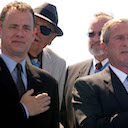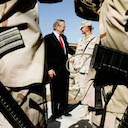
Know Your Enemy: After the Theocons, with Damon Linker
A conversation about the George W. Bush administration, the conservative religious publication First Things, and how today’s right became so deranged.


A conversation about the George W. Bush administration, the conservative religious publication First Things, and how today’s right became so deranged.

Romanticized stories about the Second World War are at the heart of American exceptionalism.

Reign of Terror situates the War on Terror as part of a longer story of domination that can be traced back to the founding of the United States as a settler-colonial and slaveholding behemoth.

If we ask the right questions, we might well conclude that political struggle rather than war is the better strategy for both sides in virtually all asymmetric conflicts.

The U.S. military is one of the world’s top consumers of fossil fuels. But it has also done pioneering research on climate change, revealing how deeply connected climate disruption is with other forms of social and political turmoil. Michael Kazin interviews climate scientist and longtime Pentagon official Jeffrey Marqusee.

By reframing war in terms of “moral injury,” philosopher Nancy Sherman dodges the question of who is responsible for its horrors in the first place.

An interview with Daniel Oppenheimer about his new book Exit Right, a survey of the twentieth-century American left, seen through the eyes of six men who left it behind and turned to the right.

The great majority of the American political class were complicit in the deceptions that led to the Iraq war—and are desperate for the rest of the country to forget it.

I was glad to read Kathleen Cavanaugh’s article on “Sectarian Entrepreneurs: How the U.S. Broke Iraq.” It is full of information, and it is an excellent guide to how many leftists think about Iraq and other similar places. But did …

The current U.S. intervention in Iraq serves as a stark reminder of the colossal policy failures that have plagued the country since 2003.